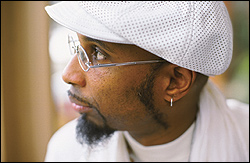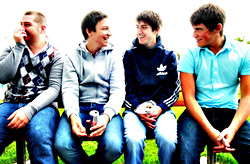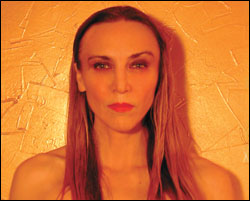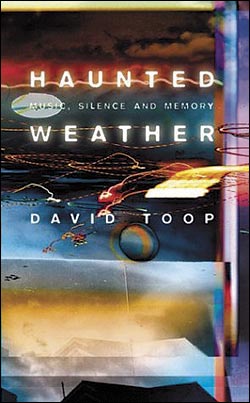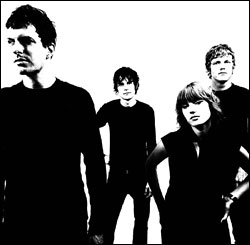Omar Sosa is unmellowing with age, or so Ballads 1997–2000 (Ota) suggests. The newly released collection finds the Cuban-born pianist waxing far softer and with less disposition toward overtly tweaking jazz heuristics than those of us who’ve come to know his work in the 21st century could have imagined. Not that he’s any more of a party pooper than on 2001’s continent-hopping Sentrir, or the live solo freak-out Aleatoric EFX, released along with the relentlessly jubilant Mulatos in 2004. (More on the latter in a minute.) Realistically, Ballads is friskier than 2002’s highly introspective A New Life (think Keith Jarrett or the Guerdjiff/DeHartmann collaborations). It’s just a bit more conceptually contained.
It’s also the fuckiest Sosa package to date. Ballads opens with “Mis Tres Notas,” which lays cards and condoms on the table as the pianist conjures variations on a theme as dark and warm as a Jurassic night over congas and bass so hypnotically buttery, they evoke a more ethnically correct Martin Denny. That comparison isn’t out of line by any means. What distinguishes Sosa from his tiki god counterpart is the depth of his musical wanderlust. Born in Cuba’s largest inland city, consummate exoticist Sosa’s intellectual and collaborative tentacles stretch from the Bay Area (where he’s been known to reside) to Mumbai by way of Darmstadt and Luanda.
Granted, a few selections on Ballads suggest that the pianist once dwelt long and hard wherever it was that Harry met Sally; “Para Ella”‘s changes pretty much force saxophonist Sheldon Brown over Viagra Falls in a barrel—very gently. Is the song an Ella Fitzgerald memorial? One can’t help but think that, even in death, she’d welcome a little more sass. Or does Sosa maybe have a pet name for Whitney Houston, for whom the mawkish refrain seems perfect?
Thank badness, the album’s vocal tracks eschew sap in favor of headier liquids. Maria Marquez’s burnished alto adds otherworldly luster to “Para Dos Parados,” her wordless melody drifting through the song like filaments of living light. Anastacia Newkirk waxes similarly syllabically over the tabla-enhanced broken beats of the super-slow “Tienes un Solo,” unleashing a measured volley of contempo R&B flourishes just when you’re starting to think you have Sosa’s eclectic agenda sussed.
Better to just surrender, and leave the driving to Omar. Mingus knows he does plenty of it on last year’s Mulatos, overlaying rhythmic prerogatives like cold cuts on a sandwich 6 feet high. Sosa got his start as a percussionist back in 1973, at age 8, focusing on piano only upon encountering a dearth of worthy marimba tutelage in Havana’s conservatories. “Nuevo Manto” finds him wielding the mallets once again, decorating Paquito D’Rivera’s clarinet-generated whimsy with enough wit to earn the pair massive grants in any country north of the Mediterranean. The two Cubans are a minority on the album, which also features Frenchies Renaud Pion and Phillipe Foch on clarinets and tablas, respectively; Tunisian oud virtuoso Dhafer Youssef; English drummer, turntablist, and producer Steve Arguelles; German bassist Dieter Ilg; and Morrocan multi-instrumentalist Aziz Arradi. (Sosa’s quartet at the Triple Door will be feature saxophonist Eric Crystal, bassist Geoff Brennan, and drummer Marque Gilmore.)
The contents of Mulatos‘ high-powered melting pot simmer admirably on “Nuevo Manto,” a snaky, midtempo rhumba update that recalls Tito Puente’s “Oye Como Va” (he did it first), Afro and Euro elements coexisting in perfect balance even in D’Rivera’s delightfully convoluted solo. Pion works considerably more grease into his bass clarinet part on “La Tra,” Sosa responding with cascades of magisterial elegance, while Youssef— a hot item on the world jazz circuit— adds a plaintive air that smacks more of Odessa than Tangiers.
The oudist’s choice of itineraries is anything but flukey. Like his session-mates, Arradi—a pal of pan-Africanist mix-master DJ /rupture—never lets where he comes from interfere with where he wants to go. Mulatos is nowhere near as challenging as Aleatoric EFX or the ritualistic Pictures of Soul (also released in 2004), nor does it have to be. Sosa is perfectly at home running on chops and charm alone. “L3Zero” finds him bouncing blithely between piano and marimba, alternating classic mambo chromaticism with rectilinear pyrotechnics in a frame so good-naturedly languid, you don’t notice the muscle rippling beneath its surface.
At least not at first, which makes Mulatos a lucky piece of documentation. Like Dave Douglas, Sosa rarely repeats himself, opting for constant changes in context, mood, and lineup in lieu of old-school stylistic consistency. Crosscutting cultural prerogatives as readily as the Jazz at Lincoln Center crew mixes historical signifiers, Sosa reinvents himself—as well as bringing much needed refreshment to jazz’s parched present—every time he sits down to play. Unless, of course, he’s standing.
The Omar Sosa Quartet play the Triple Door with the Dafnis Prieto Quartet at 6:30 p.m. (all ages) and 9:30 p.m. Sun., Oct. 23. Part of the Earshot Jazz Festival. $18 Earshot members/$20.
